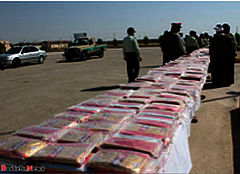Talks Revive on Plan for a “Secure Drug Smuggling Corridor to Europe”
» In Response to Ahmad Shahid’s UN Report on Executions
Following the report by Ahmad Shahid, the UN special rapporteur on human rights in Iran, which states a rise in executions and human rights violations in Iran in the last two years, a member of Iran’s parliament claimed that human rights organizations were making political use of the executions of drug dealers in Iran and proposed that officials of the country drop controlling the corridor used by drug smugglers in Iran to traffic drugs to Europe, thus allowing the smugglers to safely transport their drugs destined for Europe.
GholamReza Assadolahi, the former head of the Revolutionary Court in the south-eastern city of Zahedan and currently a member of parliament said, “This report is political and presents a harsh view on human rights and particularly on the convicted drug smugglers.” He then asserted that since Europeans did not appreciate the efforts Iran was making in controlling drug trafficking, Iran should stop fighting drug smugglers in the corridor that was used by smugglers to transport drugs to Europe, letting Europeans to take care of it themselves.
This is not the first time such a suggestion has been made in Iran. Mohammad Javad Larijani, the brother of the head of Iran’s judiciary and the official in charge of Iran’s human rights council spoke about this in May of 2011. He argued that if Iran stopped controlling the drug corridor to Europe, and thus reduced the number of executions in the country, the volume of drugs going to Europe would significantly rise.
More recently he told the foreign minister of Austria that 80 percent of executions in Iran were because of its dedication to fighting drugs and drug smugglers because the country had an 800 kilometer border with Afghanistan, the main transit channel of drugs to Europe. “The main destination of illegal drugs is Europe and it is not fair that Iran should be spending millions of Dollars annually to fight this while also giving martyrs for this, and yet be criticized over human rights for relentlessly fighting drug smugglers,” he said.
From the first days of Mahmoud Ahmadinejad’s presidency and again in 2006 when relations between Iran and Europe took a sharp downward turn over the nuclear issue, the possibility of creating a safe corridor in Iran for drug smugglers to carry their drugs to Europe was discussed. At the time, Ghorbanali Dori Najafabadi, the attorney general and currently member of the presidium of the Assembly of Experts on Leadership said, “If Europeans continue their confrontation with Iran over the nuclear issue then Iran can allow the transit of illegal drugs through Iran, not through its land but through sea and other areas.”
Other Majlis deputies such as Heshmatollah Falahatpishe and Ahmad Pishbin had also echoed similar views and proposals to create a safe corridor for smugglers to take their drugs to Europe via Iran.
But Mostafa Poormohammadi, the minister of interior during Ahmadinejad’s presidency and currently the minister of judiciary in Rouhani’s administration disagrees and has spoken against it. “It is a major mistake for us to allow our country to be used as a safe haven for drug smugglers to take their drugs through and it is against our policies.” Sometime later in 2012 (December/January) when he was the head of the state inspectorate organization he explicitly told Tejarat Farda publication that such a safe corridor had already been created by certain state agencies and that it was active. In the same interview he said allowing for the transit of drugs in any manner was “treachery against mankind. There was absolutely no benefit from it. Such an act is detrimental for the country.”
On December 7, 2014 an official from the Baluchistan province, Ali Asqar Mirshekar, implicitly announced that a water corridor had existed for drug smugglers. “When the borders of the northern provinces in the country were secured the drug corridor moved to the south but currently it has shifted to the sea and the territorial waters in the south.”
International reports, including the US Treasury Department, have said that members of the Revolutionary Guards in Iran have had a hand in drug trafficking and have named Gholamreza Baghbani as one such official who is also on the US sanctions list.



